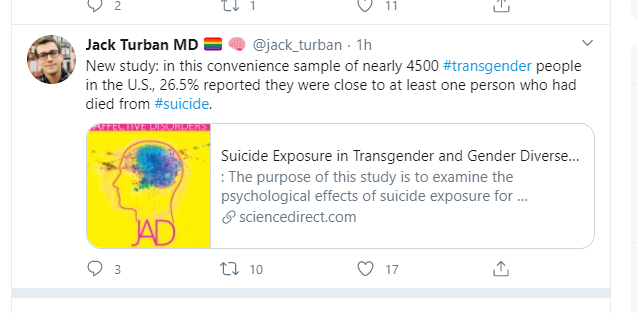
With transgender lobby @PrideinSportAU, 8 major sport bodies put out a statement on trans "inclusion" @RugbyAU @AFL @NetballAust @TennisAustralia @unisportAU @WaterpoloAus @touchfootyaus @HockeyAustralia Their policy enables male-bodied transfemales to compete in female sport. 1/
They justify this with the suggestion that if trans players are not included, suicide may result. That's a serious issue -- & there are serious questions about activist use of statistics on suicide risk. Did those 8 sporting bodies do their due diligence?
medianet.com.au/releases/19226…
medianet.com.au/releases/19226…
Their statement says: "Data from the National LGBTI Health Alliance state that trans & gender diverse adults are nearly 11 times more likely to attempt suicide than the general population, with 35% of trans & gender diverse adults having attempted suicide in their lifetime".
.@lgbtihealth is an activist body. Its February 2020 mental health snapshot is a summary of advocacy-driven research. It claims "transgender people aged 18 and over are nearly eleven times more likely (to attempt suicide than the general population)".
d3n8a8pro7vhmx.cloudfront.net/lgbtihealth/pa…
d3n8a8pro7vhmx.cloudfront.net/lgbtihealth/pa…
Any suicide is a tragedy but for this claim to be credible, it would have to be based on a study sample of trans people which is representative of the real world trans population. I can't find a source in the report for this "11x more likely claim". Anyone know?
This Feb 2020 snapshot also claims "35% of transgender people aged 18 and over have attempted suicide in their lifetime". A footnote says this was a Scottish study but I couldn't find a direct citation of that study. It seems to be this 2012 survey scottishtrans.org/wp-content/upl…
This Scottish study boasts "groundbreaking data" from "the largest survey of its kind in Europe". However, like all other trans suicide risk studies I'm aware of, its design is low quality, meaning it may not say anything accurate about trans people in general in the real world.
It's another self-selected sample (889 people) recruiting via sources such as "trans support groups, online forums and mailing lists". The researchers admit: "There is no way of knowing for sure how representative this sample is." And they add a significant caveat.
Caveat: "For the participants in this survey, 65% felt that there were trans-related reasons which made them think about or attempt suicide, while 61% identified non-trans reasons as relevant. This suggests that although being trans may be one factor, others are also relevant".
That caveat that does not appear in today's statement by @PrideinSportAU & the 8 "inclusive" sport bodies. No sign of it in the @lgbtihealth Feb 2020 snapshot either, though this report admits the studies it cites may have "methodological issues". Now that's a credible claim.
UPDATE: I asked @lgbtihealth about the suicide risk claims relied on by @PrideinSportAU & multiple sports for trans-inclusion. The source is the 2012 Scottish study, a low-quality design with a non-representative sample. A referencing error makes it look like an Aussie source.
.@lgbtihealth takes the self-report of "35% attempt suicide" & says it means trans people are almost 11 times more likely to do this than the general population. But the non-representative sample means that 35%, even if correct, cannot be generalised to trans people at large.
• • •
Missing some Tweet in this thread? You can try to
force a refresh



